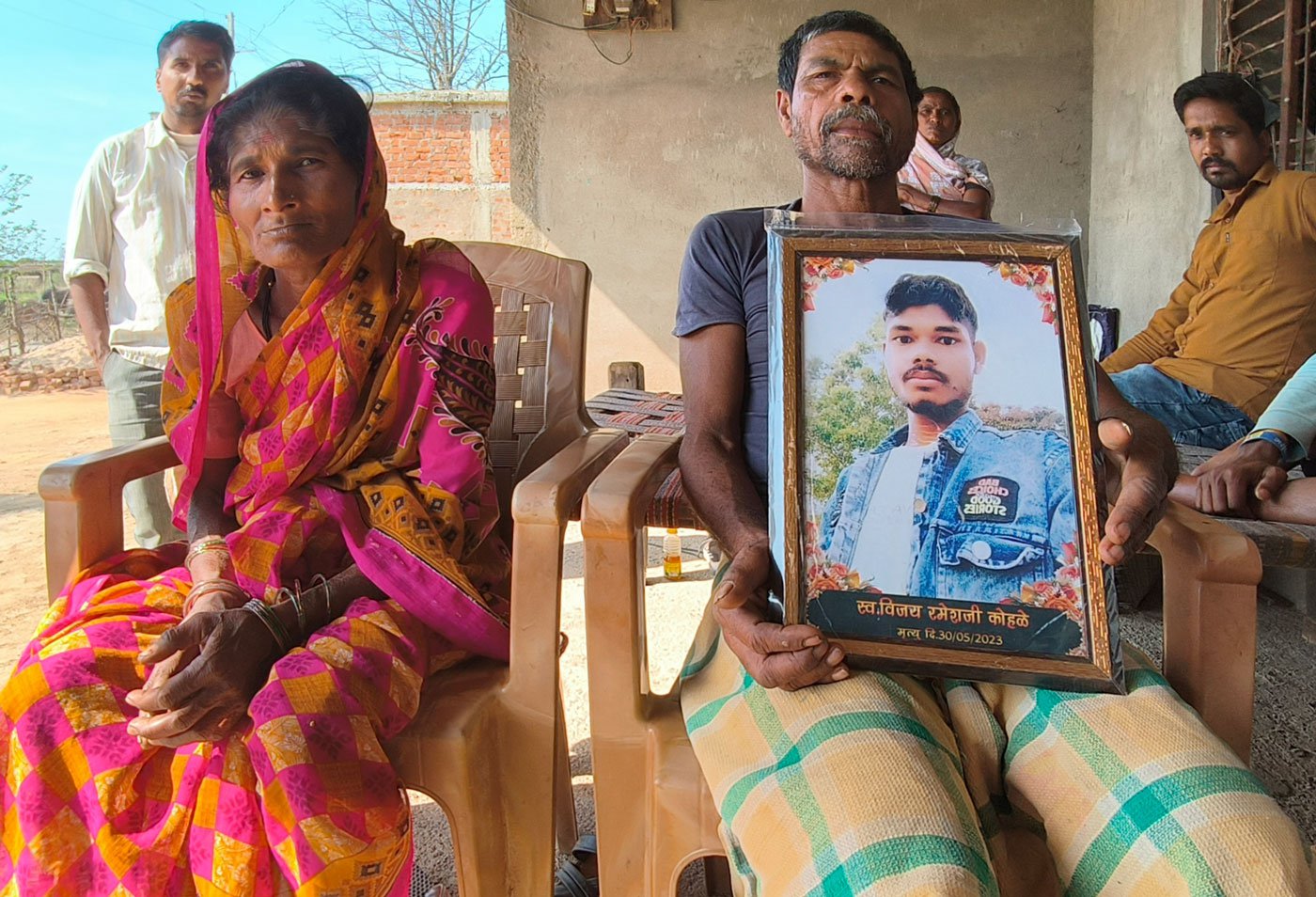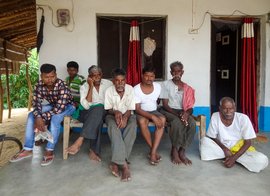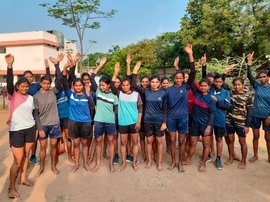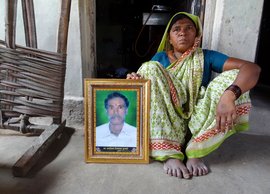Anil Narkande worked hard setting up the wedding venue, like he does every time. But he did not foresee a twist in the tale!
The 36-year-old farmer, who doubles up as a decoration and music provider in Bhandara’s Alesur village, erected a large yellow shamiyana (marquee) for a wedding in a neighbouring village and decorated the venue with tens of plastic flowers. He sent in chairs for guests; a dark-red special wedding sofa for the bride and groom and put in DJ equipment and lighting to provide for music and illumination at the wedding venue.
The groom’s modest mud-and-brick house got a face-lift for the wedding – the bride was coming from Seoni in Madhya Pradesh, across the Satpura hills.
Things went south on the eve of the wedding, says Anil, who was looking forward to a roaring start for his business in the ensuing summer wedding season. A day before the nuptials, the 27-year-old groom, who migrates for work to other states, ran away.
“He called his parents and said he would drink poison if the wedding was not called off,” Anil recalls, “he had a crush on someone else.”.
By the time the wedding was called off, the bride and her wedding party had already arrived. A happy occasion turned into a huge embarrassment for the boy’s parents and their village.
The groom’s crestfallen father told Anil that he
won't be able to pay his fee.
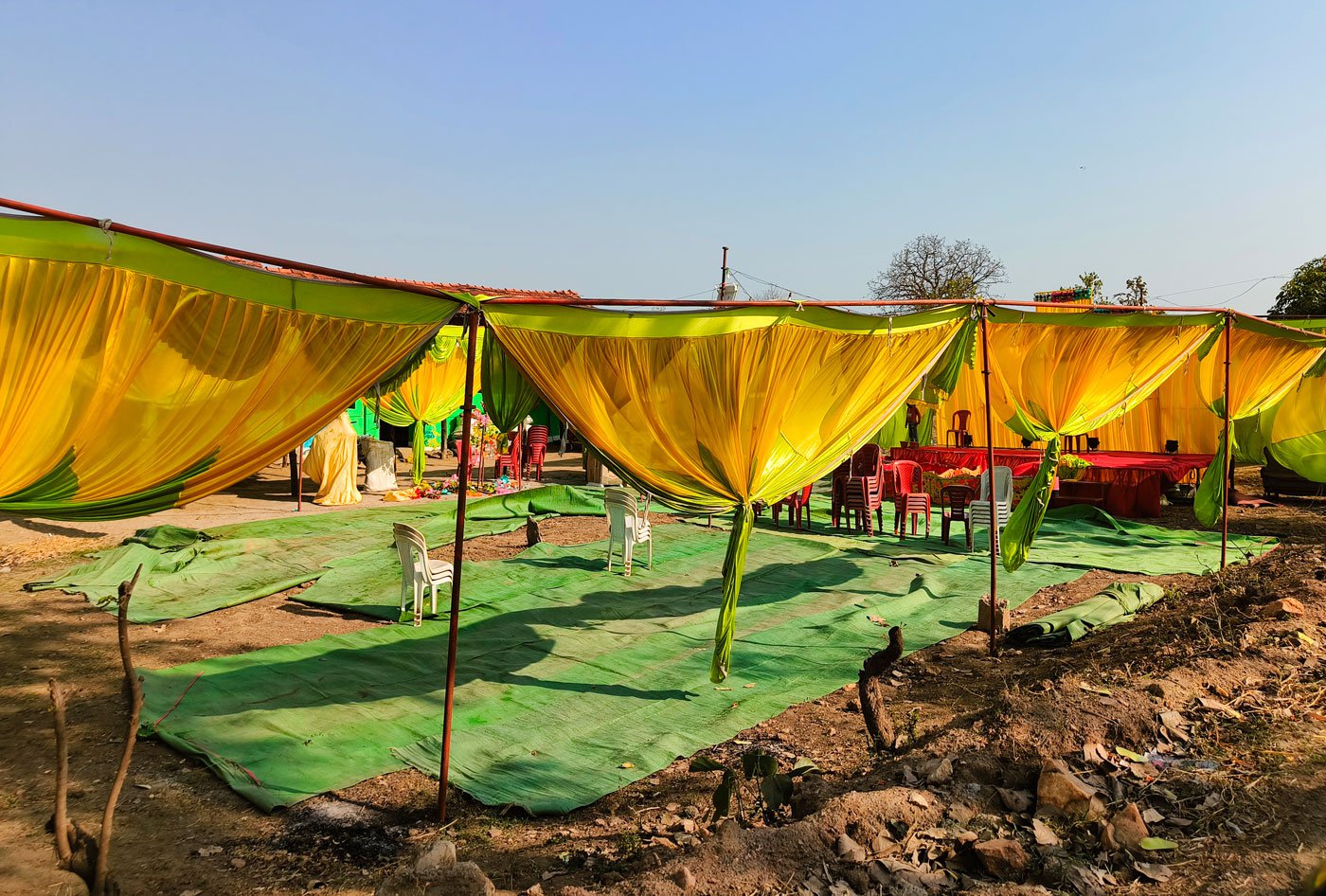

Left: The wedding venue decorated by Anil Narkande near Alesur in Bhandara’s Tumsar tehsil where he lives. In a strange twist, the groom ran away on the eve of the nuptials, leading to the wedding being called off. The groom's father could not afford to pay Anil his fee. Right: With farmlands no longer a stable source of income, many like Anil have turned to small businesses to earn a livelihood. Anil has invested Rs. 12 lakh over the last few years to build his decorator business
“I didn’t have the heart to ask for money,” says Anil, sitting in his home in Alesur, a village in Bhandara where most people are small farmers and farm labourers. “They are landless Dhivars [fishermen caste]; the groom’s father had to borrow money from his relatives,” he says. Anil asked the man to only pay his labourers, and decided to forgo his own bills.
The freak incident caused a loss of Rs. 15,000, Anil says, as he shows us his godown of decoration items – bamboo logs, stage frames, huge speakers and DJ instruments, colourful pandal cloths, and special sofas for the newly-weds and other things, for which he has built a spacious hall alongside his modest cement house.
Alesur village lies at the foothills of the Satpura range, in the forest belt of Tumsar tehsil . In this one-crop area, farmers grow paddy on their small holdings, and after the harvest, most migrate in search of work. With no major industry or other services that generate employment, a vast majority of tribal and backward class population in this area depend on the forest in the summers for their livelihoods. And Tumsar has a bad track record when it comes to MNREGA work.
So, many like Anil run small businesses to eke their living, which too has been affected by stagnant or declining farm income.
DJs and decorations have caught on in the countryside, but running a business is not easy in hard times, says Anil. “Economic condition of villagers is precarious.”
Anil has always been a BJP voter – his Gaoli
community has had proximity with the local BJP leaders, but he’s seeing a shift
in the political choice of the villagers (the Bhandara-Gondia Lok Sabha
constituency cast its vote in the first phase of the General Elections on April
19). “
Lokanna kaam nahi; trast aahet
[People have no work; they are worried],” he says. The fact that the sitting
BJP MP, Sunil Mendhe, did not visit the area to meet people even once in his
five-year tenure, has fuelled the anti-incumbency against him, a cross section
of people PARI spoke to say.


Anil stores the items in a godown in his home – sofas for the newlyweds, DJ sets, speakers, cloth for the shamiyana (marquee) and frames among other things
Women here go to work on big farms every day, Anil says. If you come to the village in the morning, you’ll see them on motor-vehicles, leaving for work, and returning late in the evening. “Young men leave for other states to work in industries, road or canal construction sites, and heavy duty jobs,” he says.
If he had better health he too may have migrated for work, says Anil, who has two children, one of whom has Down Syndrome. “I did go to Nagpur after I failed in the tenth class and worked as a waiter.” But then, he returned home, took out a loan and bought a tempo to ferry women labourers. When that became unremunerative and cumbersome, he sold his vehicle and came up with the idea of setting up a decoration business, about five years ago. Even for these events, he says, he mostly works on udhari (credit). “People take my services and promise to pay me later,” Anil says.
“I don’t take a fee from my clients if they want me to put up a pandal for post-death rituals,” he continues. “And I charge only 15-20,000 [rupees] for weddings because that’s how much people can afford.”
Anil has invested nearly Rs. 12 lakh in his business. He has an ongoing loan from a bank against a collateral of his seven-acre-land, which he pays in installments.
“My farm and milk business hasn’t been yielding
any better income,” he says. “I am trying my luck with
bichayat
[decoration], but more people are coming in this
business.”
*****
There’s another tragedy that’s quietly driving the public anger here: accidental deaths of young migrant labourers from the villages at distant work places. And in most cases, there is no closure or help with investigations.
Take, for instance, one of the two households
PARI visited in early April: Vijesh Kowale, an unmarried 27-year-old from the
landless Gowari (Scheduled Tribe) community, died while working at an
underground canal site of a major dam near Sonnegownipalle village of Chittoor
district in Andhra Pradesh on May 30, 2023.

Ramesh Kowale and his wife Janabai in Alesur, Bhandara, are still grieving the accidental death of their son Vijesh, who would migrate for work to Andhra Pradesh every year. The Kowales will mark the first death anniversary of their son this year even as they gear up for the wedding of their eldest son Rajesh, who works as a truck driver. The family now refuses to let their other sons migrate elsewhere for very laborious work
“We had to spend Rs. 1.5 lakh to bring his body back to our village and perform the final rites here,” his father Ramesh Kowale says. The apparent cause of his son’s untimely death according to the post-mortem report: “Electrocution.”
Vijesh accidentally touched a live wire at the site in an inebriated condition, the first investigation report (FIR) says. He died in an area hospital where he was shifted.
“We were not given any compensation by the company that recruited him despite their promise,” Kowale says. “I am still to repay the hand-loans I took from my relatives last year.” Vijesh’s elder brother Rajesh, about to get married, works as a truck driver, while his younger brother Satish works in local fields.
“It took us two days to bring his body by road in an ambulance,” Ramesh says.
In the past year, says Anil, four to five young villagers like Vijesh have died in accidents at their distant work places. But that’s another story.
In the village of Chikhali, Sukhdev Uikey hasn’t had a closure of his young and only son Atul’s death.
“Was it a murder by the members of his own group
or an accident, we don’t know,” says Uikey, a small farmer who also works as a
labourer in the village. “We did not get to see his body, because the police in
Andhra Pradesh cremated it without informing or contacting us.”

Atul Uikye passed away in May 2023 while he was working near Rajahmundry in Andhra Pradesh. His family is still seeking answers about his death. Voting in the General Elections is the last thing on their mind
In December 2022, Atul left with a group of migrants from this region for Rajahmundry in Andhra Pradesh to work in the paddy fields as a thresher operator. On May 22, 2023, he called his parents to say that they were on their way back home.
“That was his last call,” Uikey remembers. After that Atul’s phone was switched off. His sister, Shalu Madavi says he never returned home, “we learnt about his death about a week later when we began to make enquiries and went to that place.”
The family were shown some video clips which made things even more confusing. The clips showed Atul lying on the side of the road near a wine bar. “People thought he was drunk. But he must have been hit,” his father says. The post-mortem report mentions a deep gash on the back of his head. “The police showed us where he was cremated,” a restless Uikey says as he shows the FIR and post mortem report to PARI. “It’s a mystery what actually happened to our son.” The men who had gone with him are tight lipped about his death. Most of them have left the village for work this season, he tells PARI.
“Such accidental deaths of migrant workers are very common, but there’s not much we can help with,” says Sulochana Mehar, the Chikhli sarpanch , who tried in vain to follow up on the case with the Bhandara police.
Uikey and his family are more interested in finding the truth about Atul’s death than voting in the Indian General Elections. “They are of no use,” Sukhdev says of the public representatives, underlining the fact that MPs and MLAs have lost touch with the grassroots in more ways than one.
Back in Alesur, Anil says he knows both the grieving families – the Kowales and the Uikeys – because he put up the mandap [tent] free of cost for the families during the post-death rituals in their homes. “I am better off with my business and my farm even if the income is not much,” he says. “At least, I’m alive.”